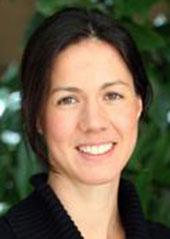By Nicholas Roznovsky

Parental leave policies have been increasingly recognized as a prime factor in the ability of employers to retain women of childbearing age, but many of the nation's top medical schools fail to meet the American Academy of Pediatrics’ recommendation of 12 weeks of paid leave for new parents.
A review of paid family and childbearing leave policies at a dozen of the nation’s top medical schools has revealed a wide disparity in the amount of time afforded to new parents by those academic institutions. In addition, new mothers and fathers often face poorly defined policies which may have significant restrictions limiting their value.
The review, published February 13, 2018, in The Journal of the American Medical Association, was led by UC San Francisco researchers Nicholas Riano, MAS, and Christina Mangurian, MD, MAS, both members of the Department of Psychiatry and Weill Institute for Neurosciences.
Parental leave policies have been increasingly recognized as a prime factor in the ability of employers to retain women of childbearing age. In fact, a recent study of English universities found that schools granting shorter periods of paid leave were more likely to see qualified female employees depart after having children, often disrupting or even ending their academic careers.
Implementation of paid leave inconsistent and largely inadequate
Despite the American Academy of Pediatrics’ (AAP) recommendation of 12 weeks of paid leave for parents, only three of the institutions surveyed—Duke University, Stanford University, and the University of Washington—granted that amount for birth mothers. Half of the remaining schools allowed for the possibility of extending their lesser leave allotments, primarily for medical reasons. Overall, the average amount of fully paid childbearing leave granted was 8.6 weeks, far short of the AAP recommendation.
“We already have strong evidence supporting the beneficial effects of 12-weeks paid leave for the physical and mental well-being of both the infant and mother,” said the study’s senior author, Mangurian, an associate professor of clinical psychiatry and departmental vice chair for diversity. “Given that these policies also help retain women, it seems like a no-brainer for leading medical schools to implement these family-friendly policies.”
Several institutions left the duration of leave allowed up to the discretion of department leadership or other administrative supervisors, a practice shown by previous research to place women at a severe disadvantage in terms of career trajectories and wages.
“Allowing for supervisory discretion in leave policies may also affect how women who take leave are perceived,” the authors noted, “inadvertently encouraging women or forego to take shorter leaves.”
Restrictions on eligibility for paid family leave were also identified as another concern. The existence of policies with explicit provisions for parents other than the birth mother—such as fathers, adoptive parents, domestic partners, and those in same-sex relationships—varied widely. Five of the universities in the study only granted leave to “primary caregivers,” severely limiting the availability of leave benefits to non-birth parents. This lack of support for cooperative parenting may be a key contributor to the attrition of women in academia, the authors surmised.
“Navigating parental leave policies was unnecessarily complicated for me," shared co-author Erin Accurso, PhD, an assistant professor of psychiatry at UCSF, "and indeed we found that policies are written in an ambiguous manner. We hope our research encourages greater transparency and clarity in policies.”
Changes on the horizon?
Since the passage of the Family and Medical Leave Act in 1993 (which guarantees only the right of workers to unpaid leave), the lack of support for paid family leave in the United States has increasingly become a matter of national debate. The U.S. is currently the only developed country in the world which does not mandate paid parental leave, despite studies showing its physical and mental health benefits.
Last month, UCSF announced it will amend its policies to provide 12 weeks of paid childbearing leave to faculty members by July 2019, doubling the amount currently available. This change will impact nearly 3,000 faculty members.
“I am incredibly proud to be a faculty member at an institution where our top leadership is dedicated to creating a more diverse and inclusive environment,” said Mangurian. “This UCSF family-friendly policy change is a wonderful and tangible example this commitment.”
The study’s authors said that additional research is merited on the assessing policies at a wider range of institutions and the association between leave policies and the retention of women in academic medicine.
Also contributing to the study were Dawn Sung, MD, of UCSF Psychiatry; Eleni Linos, MD, DrPH, of the UCSF Department of Dermatology; Elizabeth Linos, PhD, of UC Berkeley's Goldman School of Public Policy; and Julia F. Simard, ScD, of Stanford University's Department of Health Research and Policy.
Read the study
- The Journal of the American Medical Association: Paid Family and Childbearing Leave Policies at Top US Medical Schools
Further coverage
About UCSF Psychiatry
The UCSF Department of Psychiatry and the Langley Porter Psychiatric Institute are among the nation's foremost resources in the fields of child, adolescent, adult, and geriatric mental health. Together they constitute one of the largest departments in the UCSF School of Medicine and the UCSF Weill Institute for Neurosciences, with a mission focused on research (basic, translational, clinical), teaching, patient care and public service.
UCSF Psychiatry conducts its clinical, educational and research efforts at a variety of locations in Northern California, including UCSF campuses at Parnassus Heights, Mission Bay and Laurel Heights, UCSF Medical Center, UCSF Benioff Children's Hospitals, Zuckerberg San Francisco General Hospital and Trauma Center, the San Francisco VA Health Care System and UCSF Fresno.
About the UCSF Weill Institute for Neurosciences
The UCSF Weill Institute for Neurosciences, established by the extraordinary generosity of Joan and Sanford I. "Sandy" Weill, brings together world-class researchers with top-ranked physicians to solve some of the most complex challenges in the human brain.
The UCSF Weill Institute leverages UCSF’s unrivaled bench-to-bedside excellence in the neurosciences. It unites three UCSF departments—Neurology, Psychiatry, and Neurological Surgery—that are highly esteemed for both patient care and research, as well as the Neuroscience Graduate Program, a cross-disciplinary alliance of nearly 100 UCSF faculty members from 15 basic-science departments, as well as the UCSF Institute for Neurodegenerative Diseases, a multidisciplinary research center focused on finding effective treatments for Alzheimer’s disease, frontotemporal dementia, Parkinson’s disease, and other neurodegenerative disorders.
About UCSF
UC San Francisco (UCSF) is a leading university dedicated to promoting health worldwide through advanced biomedical research, graduate-level education in the life sciences and health professions, and excellence in patient care. It includes top-ranked graduate schools of dentistry, medicine, nursing and pharmacy; a graduate division with nationally renowned programs in basic, biomedical, translational and population sciences; and a preeminent biomedical research enterprise. It also includes UCSF Health, which comprises top-ranked hospitals – UCSF Medical Center and UCSF Benioff Children’s Hospitals in San Francisco and Oakland – and other partner and affiliated hospitals and healthcare providers throughout the Bay Area.









